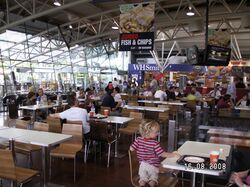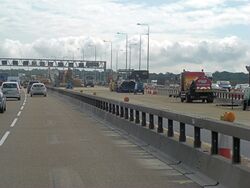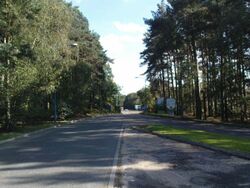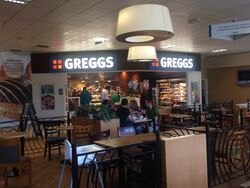Price Point: Why are motorway services so expensive?

Since the dawn on time, motorway service areas have been lambasted for their poor quality and high prices. Changes to the choice of food appear to have addressed the quality issues, but the complaints about the prices remain unaddressed. In 2019, just 59% of service station customers said they felt they had received value for money, while 91% said the food was "good".
Now that most service stations are using food and retail brands that can be found in town centres, customers expect the prices to be the same as the High Street too. They are not. The vast majority of food prices at motorway outlets are set by the service area operator, so there is no competition between each outlet, and an inflated price applies to most products. This is a situation that service areas share with other transport hubs, like airports and railway stations, which are a much more comparable industry than a shopping centre.
Customers have always blamed this motorway premium on corporate greed: motorway service areas are private businesses out to make money, and they know that the majority of their customers would not be willing to leave the motorway to find somewhere else to stop. Their only real competition comes from each other, and given that most roads are only shared by two or three operators, this has created an oligopoly with relatively little influence over custom levels.
In addition, the motorway service area industry is a difficult industry to enter. The existing firms know there is not going to be many new operators breaking through: for starters, planning authorities tend to be hostile to motorway service areas, so are unlikely to let two be built close together. It's not impossible though, and if operating a service station was as easy as it sounded, obvious candidates such as supermarkets wouldn't have turned their noses up at the idea of running one.
Welcome Break summarised their position in 2025 by saying they "trade at different price points to conventional retail offers", and added that this puts off local traffic. They put this position down to their sites being "expensive to build and operate"; some theories on why this could be are discussed below.
Big Spenders

The main reason the motorways have such little variety of operators is that you need very thorough financial backing to get the project done. Building motorway service areas has always been expensive due the amount of work involved, but in the 21st century those costs ballooned at an incredible rate. In 2024, Welcome Break estimated that building a new service area on the M25 will cost them £155million - assuming inflation stays in check.
The first reason for this is that traffic levels have risen so much that new service areas need to be larger than ever before. British motorways tend to have higher traffic levels than other countries, so you need big car parks and dining areas to cater for the peak trade. But what tends to be more expensive is that you also needs much grander slip roads to be able to safely carry high levels of traffic in and out. The tiny little acceleration lanes that we used to see in the 1960s are no longer allowed. Safely carrying out this construction around that much live traffic is expensive too, especially as many motorways don't have hard shoulders any more. You can save money by building at an existing junction, but if you need to widen a roundabout to get the project approved, that could become a multi-million pound scheme in its own right. All of these costs must be paid for by the developer, using money that they hope they will make back from coffee and burgers.
Related to that is that most of the easy places to build a service station have already been taken. The proposed Colne Valley services on the M25 is going to need the Slough Road bridge to be moved out the way, part of the M25 to be widened, and gantry signs to be modified, just to make enough space to build the four slip roads. These would all be expensive projects in their own right, but the developer has to pay for it if they want the only space that's available. The same goes with the cost of buying the land: while people assume motorway service areas are in rural areas, actually most new sites are on the edges of urban areas, where land is much more expensive.
These two issues tie into one big one: planning costs. Almost all motorway service areas face a public inquiry; they also inevitably receive detailed objections from other operators and a petition from at least one residents' group. The required environmental statement and transport assessment are novels in their own rights, which will have to be rewritten if a flaw is found. Plans to build a service area on one field by the M42 have been in the planning system effectively for 60 years. Deep pockets and experienced minds are required to survive the legal process.
A final point to consider is that the rise in demand for electric vehicles means that local electricity infrastructure has to be reviewed to make sure the new facility will be equipped for the future.
While Extra were developing Cobham services in 2010, the company fell into administration. They had registered plans for a number of different motorway service areas but only around one in three of them had secured planning permission.
Running Up A Bill

The obvious problem service stations have to contend with is the requirement to be open 24 hours a day, selling fuel, food and drinks even in the early hours of Christmas morning. The vast majority of customers are only using free facilities such as the toilets and the car park, which are provided at great expense. It was previously said around 70%-90% of customers were doing this, but that was in an era before people were accustomed to snacking all day.
This regulation can be so constraining that some developers are now opting to build a site next to a motorway but not register it as an official service area (which would involve signing a Traffic Signs Agreement and placing signs on the motorway). Doing this allows them to make the site as small as they wish, discourages non-purchasing customers and means the developer can open and close whenever they want.
Some service areas are located in remote areas and recruiting and retaining staff for what is essentially a retail job can be difficult. (Retail work is usually badly paid so often attracts candidates who can't afford to drive; service stations have to find a solution to this as they are unlikely to be safely accessible on foot.) Staffing is made more difficult by the fact that trade levels can be very unpredictable: at one moment several coaches may stop together, at the next the motorway may be blocked by an accident. London Gateway, for example, lost three days of trade, hotel bookings and stock because the M1 was closed for an incident. Trade can also be impacted by roadworks, with several service areas reporting a 40% drop in trade during a major construction project as drivers didn't want to lose any more time. At the opposite end of this scale, as service areas are mostly only used when they are needed, there is relatively little they can do to encourage more people to visit when times are good.
The remote locations can raise other operating costs too, including the cost of building a sewerage system that can handle the high customer levels, as well as the costs associated with calling out contractors and arranging deliveries. As each operator usually owns a network of service stations that are thinly spread across the country, they are normally limited to working with national firms who can supply anywhere in Britain.
For sites which lease their land, that can cost another £2.5million per year; this is the result of a 1995 government policy of encouraging "pension funds, insurance companies and leisure groups" to bid for land which had so far been owned by the government and effectively leased for free.
The large parking areas and supporting infrastructure mentioned above all have to be maintained, too. Unlike in most other countries, British service stations are responsible for repairing their own road right up to the motorway boundary, including its signs and lampposts. They also have to maintain their own signs on the motorway, which means hiring a contractor who is trained to safely close motorway lanes.
The final issue is that many of the UK's motorway service areas were built in the 1960s, and are now over 50 years old. These buildings can be difficult to manage, not just because their layout isn't good for modern catering, but because they require regular maintenance, they quickly look tired, and they often straddle the motorway where it's hard to safely carry out any work.
Operators don't often put these issues into exact numbers, perhaps because it's complicated and not always favourable. One 1991 study suggested a new motorway service area cost £7million, and that it would then spend £2million per year on providing free toilets, £100,000 per year on repairing vandalism and £200,000 to resurface the car park. Adjusted for inflation, that would be around £16million to build, £5million on toilets, £225,817 on vandalism and £451,634 to resurface. However, the actual running costs for today would be much higher, as adding inflation doesn't factor in new issues such as planning costs, as discussed above.
Government Solutions
As early as 1965, a government statement responded to growing criticism by saying "we cannot dictate prices but we are concerned that they should be reasonable". However, they remained reluctant to accept there were any issues. They said that the nature of the business meant there were high running costs, especially at night, and when they investigated, they found prices were not as high as they had been told to expect.
The first problem was the rent arrangements which had been made. Service stations used to pay rent as a proportion of their turnover, not profit, so any investment that attracted more customers would immediately mean paying more rent even if the profit margin hadn't increased. This meant several early operators struggled to break even (an estimated 3 out of 12 were losing money in 1966). Service areas were eventually sold the freehold of the land they were built on.
Since then the government has always had one word in response to price complaints: deregulation. Initially the motorway was one of the most heavily regulated industries in the country, with limits on shop sizes, little control over the site layout, a total ban on promoting your facilities and a rule that effectively prevented them being too popular. These all ate at costs, but regulations were cut back on in 1979, 1992 and 2013. Now the industry is much more free market, leaving operators free to try out new ideas, while still being free to charge whatever they like.
Customer Tricks

See also: Mobile Apps
Some people will go to great lengths to avoid spending money at a service area, from packing their own food to even heading down unknown B-roads in a desperate bid to find fuel. For many people this isn't practical, so they may instead prefer to head for the fast food chain for lunch or just WHSmith in order to find enough snacks to keep them going until the next stop.
Service areas do occasionally run their own promotions, which are listed below, but these are becoming rarer now that they rely on big-name food brands. Most food brands now have their own app with discounts or loyalty points, but tread carefully: the nature of the franchise agreement means that a brand's promotions or loyalty points may not be valid, so always check the small print and confirm with staff.
Franchising also means that food and shop brands will probably charge different prices depending on who runs it. McDonald's franchises tend to have only a small mark-up, while KFC franchises tend to have a much larger one. This was reflected in the 2023 Transport Focus review: customers of Moto and Welcome Break were revealed to be far less satisfied for the prices they were charged than customers of Roadchef and Extra. This tells us customers are noticing something we already knew: Moto and Welcome Break run their own food franchises and inflate their prices; Extra normally let the brand charge its own prices and Roadchef do run McDonald's franchises but with normal prices. When Burger King was first introduced to the motorways, prices were marked up by as much as 87%.
Working out if it's a franchise or not can get confusing. Most motorway food and shop units are ran by the operator, while a store on an A-road could be run directly by the brand, or as a franchise from another operator. Our guide lists who runs each facility under "operators".
Holders of discount cards such as Blue Light, Forces and Veterans discounts should always check, as most cards are accepted.
Coach and HGV drivers often have no choice but to use a motorway service area, so the operators often provide special discounts to attract them to their facility in particular: these are detailed on the Professional Drivers page.
Discounts and information posted on this page were correct when they were added, but policies may have changed since. You should always check with staff on site.
Further Reading
- Moto
- The Moto App - Moto offer two "daily deals" to app holders
- List of accepted discount cards
- Why do prices at Motorway Service Areas sometimes seem so high? - as the ones who charge the prices, sure enough Moto have an excuse ready.
- @motoway on Twitter/X - Moto run promotions and competitions on Twitter/X
- Welcome Break
- Merlin annual pass holders receive 20% off most items at Welcome Break (as of June 2021).
- Camping and Caravanning club members receive 20% off most items at Welcome Break (as of September 2021).
- @welcomebreak on Twitter/X - Welcome Break run promotions and competitions on Twitter/X
- Roadchef
- Deals - Roadchef's offers page. At the moment, they are providing instant access vouchers.
- @roadchef on Twitter/X - Roadchef run promotions and competitions on Twitter/X
- Extra
- @extraservices on Twitter/X - Extra run promotions and competitions on Twitter/X
- Just off Junction - A website listing a variety of locations near the motorway, including petrol stations and supermarkets